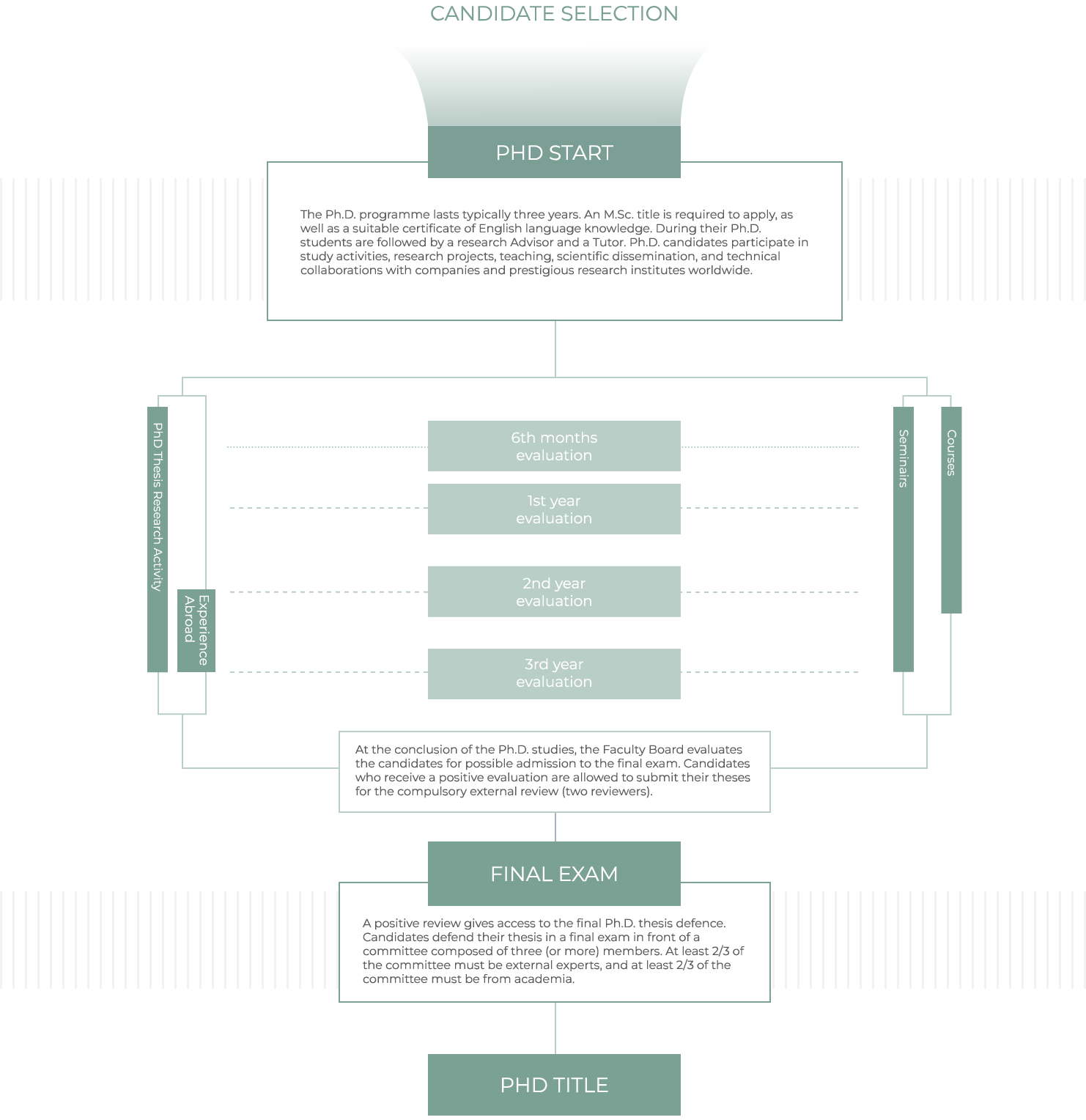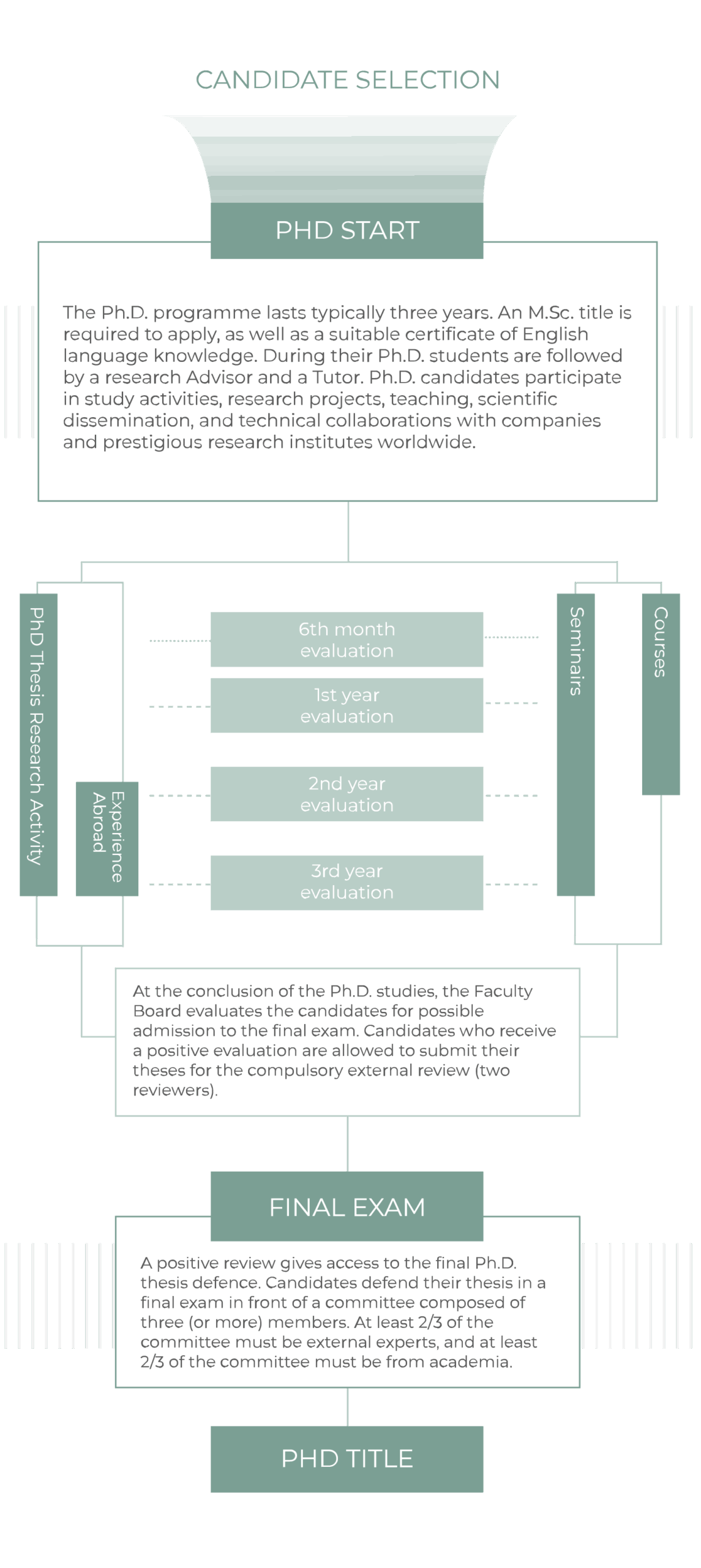Ph.D. in Step-Change
The PhD programme in Science, Technology, and Policy for Sustainable Change – STEP-CHANGE – prepares the future generation of scientific experts to address the challenge of global change and steer society toward a sustainable and inclusive transition, including accelerating the penetration of green technologies, fostering industry decarbonization, and designing sustainable policies from cross-sectoral perspectives. The program offers a multicultural and trans-disciplinary research environment with faculty from 11 out of 12 POLIMI departments. At the end of the program, Ph.D. candidates are expected to possess the competencies and capacities required to support and inform the process of policy and strategy design for innovation-driven responses toward sustainable development.
Download the students brochure >
3 years
Milano Leonardo and Bovisa
11
5 – 10
Start here
The Ph.D. programme
The STEP-CHANGE Doctoral Programme is a multi-departmental endeavour based at the Dipartimento di Elettronica, Informazione e Bioingegneria and involving ten other departments of Politecnico di Milano.
Students will gain research capacity and skills, as well as in-depth knowledge of the complexity of Earth’s natural and artificial systems. They will be taught advanced methodologies to comprehend and model physical, industrial, societal, and digital processes that affect our planet’s ecosystem. Additionally, they will be able to develop projections of technological, ecological, and social trends to create new sustainable solutions and systems, while assessing their global environmental and societal impacts, as well as related philosophical and ethical issues.
The extensive network of international collaborations with universities and research institutions of STEP-CHANGE faculties will provide unique opportunities for Ph.D. candidates to be exposed to the most current and advanced research topics on global change through visiting periods of at least six months abroad.
STEP-CHANGE graduates are equipped with distinctive skills and advanced trans-disciplinary knowledge that open up career opportunities as analysts, researchers, or planners at universities, international research centres, public and international institutions, R&D departments, regulatory authorities, policy institutions, and other public bodies.
Research & Educational Activities
The primary goal of all Politecnico di Milano’s Ph.D. programmes is to cultivate a research-oriented attitude in the candidates, as well as advanced knowledge and proficiency in a particular research area. To achieve this, candidates must be able to identify and solve complex problems, perform in-depth problem analysis, come up with original solutions, and assess their applicability in practical contexts. These abilities give Ph.D. candidates great potential for growth in their research, both in the academic world and in public and private organisations. Ph.D. candidates must create an original research contribution that is in line with the STEP-CHANGE scope.
The Ph.D. thesis should contribute to the advancement of knowledge in the candidate’s research field. The original research results are compiled in the Ph.D. thesis, where the candidate’s contribution is placed in relation to the current state of the art in the specific research field. The research results are validated through the scientific dissemination process, with peer-reviewed publications in international conferences and journals.
During the first two years of their Ph.D., students must complete a minimum of 20 credits by taking at least four doctoral courses. These courses provide advanced knowledge and training to help students address research issues.
The STEP-CHANGE programme offers a wide range of thematic doctoral courses each year, taught by STEP-CHANGE faculty or invited professors from international institutions. These courses are open to all enrolled students as well as external attendees.
The Politecnico di Milano’s Ph.D. School also offers transversal skills courses to develop skills that are not related to the specific curriculum, such as oral and written presentation, research management, ethics of research, public speaking, and many others.
Doctoral courses taken from other universities or Ph.D. schools, as well as summer/winter schools, offer additional training opportunities.
Ph.D. students can be involved in teaching activities as teaching assistants at the Bachelor or Master levels, and can take part in tutoring activities for the orientation of new candidates or activities of the STEP-CHANGE programme. Participation in teaching and student tutoring activities is encouraged to develop communication and team leading skills.
Throughout the three-year Ph.D. program, students will be expected to present their research accomplishments in a variety of settings, including public seminars at Politecnico di Milano or other institutions, project meetings, workshops, and international scientific conferences. This will give Ph.D. students the opportunity to hone their public speaking skills and enhance their communication abilities in both written and verbal forms.
Additionally, Ph.D. students may attend schools and visit other research centers and facilities both in Italy and abroad, for a recommended period of 6 months, to conduct their research.
Ph.D. students are provided with the resources and facilities they need to conduct their work and access scientific papers and technical documentation from both local and international databases. Additionally, they can benefit from services such as subscriptions to scientific associations and language courses. Furthermore, they are allocated a personal budget to cover research-related and travel expenses.
Our University
Politecnico di Milano is a public scientific-technological university founded in 1863, which trains engineers, architects and industrial designers. The Politecnico has always focused on the quality and innovation of its teaching and research, developing a fruitful relationship with the industrial and productive world by means of experimental research and technological transfer. Research has always been linked to teaching and it is a priority commitment which has allowed the Politecnico to achieve high-quality results at an international level. The Politecnico takes part in several cooperation agreements and strategic alliances with other universities and scientific institutions, as well as industrial companies.
The 11 departments involved
DEIB – Department of Electronics, Information, and Bioengineering
DENG – Department of Energy
DIG – Department of Management, Economics, and Industrial Engineering
DCMC – Department of Chemistry, Materials, and Chemical Engineering “Giulio Natta”
DICA – Department of Civil and Environmental Engineering
DABC – Department of Architecture, Built Environment, and Construction Engineering
DESIGN – Department of Design
DASTU – Department of Architecture and Urban Studies
DAER – Department of Aerospace Science and Technology
DMEC – Department of Mechanical Engineering
DMAT – Department of Mathematics “Francesco Brioschi”

People & Contacts
The Ph.D. course is managed by a Coordinator and a Faculty Board. The Coordinator chairs the Faculty Board, coordinates the preparation of the annual Educational Programme and organises the general educational activities of the Ph.D.

